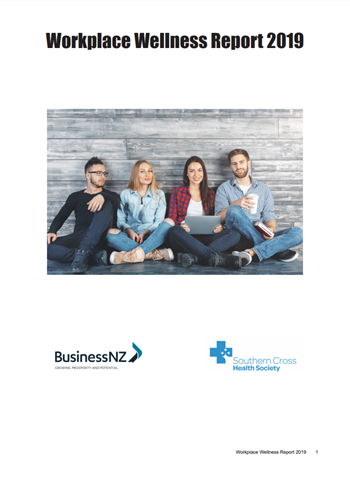State of the nation's workplace health revealed
Research released today by Southern Cross and BusinessNZ has revealed the latest picture of health and wellness in the New Zealand workplace.
The 2019 Workplace Wellness Report has found employee absence cost the New Zealand economy $1.79bn in 2018, up from $1.51bn in 2016. At the same time, a net 23.5 per cent of businesses surveyed reported an increase in general stress experienced by staff.
 It is the fourth time the biennial survey (previously named Wellness in the Workplace) has been carried out. It canvassed 99 private and public sector businesses representing more than 121,000 employees, or 6.21 per cent of New Zealand’s workforce – the largest number since the survey began in 2013.
It is the fourth time the biennial survey (previously named Wellness in the Workplace) has been carried out. It canvassed 99 private and public sector businesses representing more than 121,000 employees, or 6.21 per cent of New Zealand’s workforce – the largest number since the survey began in 2013.
BusinessNZ chief executive Kirk Hope says the report shows the cost of absenteeism for business and the economy is significant but there are some positive indicators. “Thirty-five per cent of staff are likely to turn up to work despite being sick, down from 49 per cent in 2012. This major drop shows workplace culture is shifting.
“The direct cost of absenteeism is between $600 and $1,000 per person a year, and while this is a substantial cost, New Zealand businesses need to recognise the importance of creating a culture where people feel they can stay at home when they are unwell.”
At the same time, more employers are investing in wellbeing benefits to maximise people’s health. Total investment in staff wellbeing by New Zealand businesses was an estimated $2.37bn in 2018.
Southern Cross Health Society CEO Nick Astwick says it’s encouraging to see companies actively investing in the wellbeing of their people.
“The average investment employers make in a worker’s health is just over $1,500 a year. At Southern Cross, we’ve seen a substantial benefit to productivity by investing in the wellbeing of our employees.”
In 2018, 63.3 per cent of businesses with more than 50 staff provided training for managers to identify and manage stress in the workplace, compared with only 37.3 per cent in 2014.
Astwick says the 2019 Workplace Wellness Report will enable businesses to better understand their workforce holistically across physical, mental and social drivers of health.
“This report provides an opportunity for businesses to better understand the needs of their employees. My hope is the report will get them thinking about how they can then improve support for their staff.
“We spend about 1,900 hours a year at work, so it’s important to both invest in our people’s wellbeing and create cultures where sick days are acceptable. It’s the right thing to do for businesses and for staff. A culture of health leads to a healthy culture,” he says.
In 2018, Southern Cross launched BeingWell, a wellness programme for New Zealand businesses. After implementing BeingWell, some clients have started offering staff additional sick days, a paid volunteer day, subsidised exercise, or flexible working arrangements, among other changes.
The big picture of workplace health:
- In 2018 NZ lost 7.4 million working days and $1.79bn due to absence, up on 2016.
- Close to half of New Zealand businesses (47.5 per cent) have five days per year (rolled over if unused) as their most common approach to sick leave entitlements.
- Absent employees typically cost their employer between $600 and $1,000 a year.
- The average rate of absence in 2018 was 4.7 days per employee. This compares with 4.4 days in 2016, 4.7 days in 2014 and 4.5 days in 2012.
- On average, businesses spend around $1,500 per staff member annually on benefits to improve wellbeing.
- A net 23.5 per cent of businesses surveyed reported an increase in general employee stress and anxiety, compared with 2016 data.
- 35 per cent of staff are likely to turn up to work despite being sick, down from 49 per cent in 2012.
ENDS